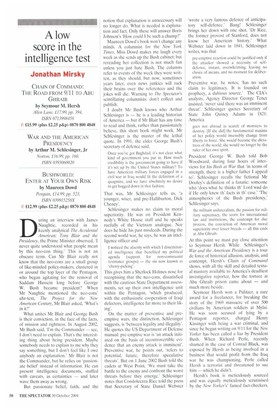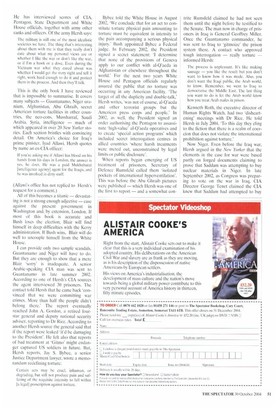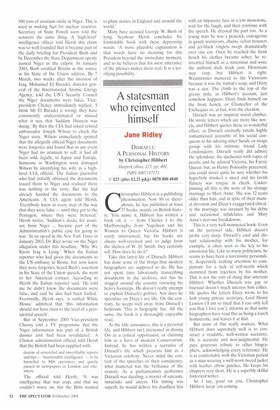A low score in the intelligence test
Jonathan Mirsky
CHAIN OF COMMAND: THE ROAD FROM 9/11 TO ABU GHRAIB by Seymour M. Hersh
Allen Lane, £17.99, pp. 394, ISBN 0713998458 £15.99 (plus £2.25 p&p) 0870 800 4848
WAR AND THE AMERICAN PRESIDENCY by Arthur M. Schlesinger, Jr Norton, 06.99, pp. 160, ISBN 0393060020
BUSHWORLD:
ENTER AT YOUR OWN RISK by Maureen Dowd
Penguin, £14.99, pp. 523, ISBN 039915258X £12.99 (plus £2.25 p&p) 0870 800 4848
During an interview with James Naughtie, recorded in his keenly analytical The Accidental American: Tony Blair and the Presidency, the Prime Minister observed, 'I never quite understood what people mean by this neo-con thing.' This is not an obscure term. Can Mr Blair really not know that the neo-cons are a small group of like-minded policy-makers, clustered in or around the top layer of the Pentagon, who began agitating for the removal of Saddam Hussein long before George W. Bush became president? When Mr Naughtie mentioned the neo-cons' uhr-text, The Project for the New American Centuty, Mr Blair asked, 'What's in it?'
What unites Mr Blair and George Bush is their conviction, in the face of the facts, of mission and rightness. In August 2002, Mr Bush said, 'I'm the Commander — see, I don't need to explain. That's the interesting thing about being president. Maybe somebody needs to explain to me why they say something, but I don't feel like I owe anybody an explanation.' Mr Blair is not the Commander, but he relies on 'passionate belief' instead of information. He can present intelligence documents, stuffed with caveats, as certainties — and later wave them away as wrong.
But passionate belief, faith, and the
notion that explanation is unnecessary will no longer do. What is needed is explanation and fact. Only these will answer Boris Johnson's 'How could I be such a chump?'
Maureen Dowd's book won't change any minds. A columnist for the New York Times, Miss Dowd makes me laugh every week as she sends up the Bush cabinet; but rereading her collection is not much fun unless you just hate Bush. The columns refer to events of the week they were written, as they should, but now, sometimes years later, even news junkies will rack their brains over the references and the jokes will die. Warning to The Spectator's scintillating columnists: don't collect and publish.
I doubt Mr Bush knows who Arthur Schlesinger is — he is a leading historian of America — but if Mr Blair has any time to read and think, rather than passionately believe, this short book might work. Mr Schlesinger is the master of the lethal quote. In 1991, the elder George Bush's secretary of defence said,
Once you've got Baghdad, it's not clear what kind of government you put in. How much credibility is the government going to have if it's set up by the United States military? To have American military forces engaged in a civil war in Iraq would fit the definition of a quagmire, and we have absolutely no desire to get bogged down in that fashion.
That was, Mr Schlesinger tells us, 'a younger, wiser, and pre-Halliburton, Dick Cheney'.
Schlesinger makes no claim to moral superiority. He was on President Kennedy's White House staff and he speaks ruefully of the Vietnam analogue. Nor does he hide his past misdeeds. During the second world war, he says, he was an intelligence officer and
I noticed the alacrity with which I disseminated intelligence that benefited my political
agenda (support for non-communist resistance groups) — the sin now known as 'cherry-picking'.
This gives him a Sherlock Holmes nose for recognising that the neo-cons, dissatisfied with the cautious State Department assessments, set up their own intelligence unit within the Pentagon, 'which produced, with the enthusiastic cooperation of Iraqi defectors, intelligence far more to their liking'.
On the matter of preventive and preemptive wars, the distinction, Schlesinger suggests, is 'between legality and illegality'. He quotes the US Department of Defense manual: pre-emptive war is 'an attack initiated on the basis of incontrovertible evidence that an enemy attack is imminent'. Preventive war, he points out, 'refers to potential, future, therefore speculative threats'. But on 1 June 2002 Bush told the cadets at West Point, 'We must take the battle to the enemy and confront the worst threats before they emerge.' Schlesinger notes that Condoleezza Rice told the press that Secretary of State Daniel Webster 'wrote a very famous defence of anticipatory self-defence.' Bang! Schlesinger brings her down with one shot. 'Dr Rice, the former provost of Stanford, does not know her American history.' What Webster laid down in 1841, Schlesinger writes, was that
pre-emptive reaction could be justified only if the attacker showed a necessity of selfdefence, instant, overwhelming, leaving no choice of means, and no moment for deliberation.
Preventive war, he notes, 'has no such claim to legitimacy. It is founded on prophecy, a dubious source.' The CIA's analysts, Agency Director George Tenet insisted, 'never said there was an imminent threat'. Schlesinger quotes Secretary of State John Quincy Adams in 1821: America
goes not abroad in search of monsters to destroy. [If she didl the fundamental maxims of her policy would insensibly change from liberty to force. She would become the dictatress of the world; she would no longer be the ruler of her own spirit.
President George W. Bush told Bob Woodward, during four hours of interviews for his Bush at War that in terms of strength, there is a higher father I appeal to'. Schlesinger recalls the fictional Mr Dooley's definition of a fanatic: someone who 'does what he thinks th' Lord wud do if He only knew th' facts in th' case.' The atmospherics of the Bush presidency,' Schlesinger says,
the militant unilateralism, the passion for military supremacy, the scorn for international law and institutions, the contempt for due process, the conviction of American moral superiority over lesser breeds — all this ends at Abu Ghraib.
At this point we must pay close attention to Seymour Hersh. While Schlesinger's War and the American Presidency is a tour de force of historical allusion, analysis, and contempt, Hersh's Chain of Command shows, with all the skill and detailed textual mastery available to America's deadliest investigative reporter, how the torture at Abu Ghraib prison came about — and much more beside.
Seymour Hersh won a Pulitzer, a rare award for a freelancer, for breaking the story of the 1969 massacre of over 500 civilians by American soldiers at Mylai. He was soon accused of lying by a Pentagon reporter, charged Henry Kissinger with being a war criminal, and since he began writing on 9/11 for the New Yorker has been called a liar by President Bush. When Richard Perlc, recently shamed in the case of Conrad Black, was exposed by Hersh as being involved in a business that would profit from the Iraq war he was championing, Perle called Hersh a terrorist and threatened to sue him — which he didn't.
Hersh's book is meticulously sourced and was equally meticulously scrutinised by the New Yorker's' famed fact-checkers. He has interviewed scores of CIA, Pentagon, State Department and White House officials, together with army other ranks and officers. Of the army Hersh says:
The military is still one of the most idealistic societies we have. The thing that's interesting about them with me is that they really don't care about what my personal views are or whether I like the war or don't like the war, or if I'm a hawk or a dove. Even during the Vietnam war what they eared about was whether I would get the story right and tell it right, work hard enough to do it and protect them in the process. And then they'll talk.
This is the only book I have reviewed that is impossible to summarise. It covers many subjects — Guantanamo, Niger uranium, Afghanistan, Abu Ghraib, secret American torture facilities in other countries, the neo-cons, Mussharraf, Saudi Arabia, Syria, intelligence — much of which appeared in over 20 New Yorker stories. Each section bristles with convincing detail. On America's choice for Iraq's prime pinister, Iyad Allawi, Hersh quotes by name an ex-CIA officer:
If you're asking me if Allawi has blood on his hands from his days in London, the answer is yes, he does. He was a paid Mukhabarat [intelligence agency] agent for the Iraqis, and he was involved in dirty stuff,
(Allawi's office has not replied to Hersh's request for a comment.) All of this becomes a titanic — devastating is not a strong enough adjective — case against the present government in Washington and, by extension, London. If most of this book is accurate and Bush loses the election, Blair will find himself in deep difficulties with the Kerry administration. If Bush wins, Blair will do well to uncouple himself from the White House.
I can provide only two sample scandals. Guantanamo and Niger will have to do. But they are enough to show that a mere Blair 'sorry' is inadequate. A senior Arabic-speaking CIA man was sent to Guantanamo in late summer 2002. According to one of Hersh's CIA sources the agent interviewed 30 prisoners. The contact told Hersh that he came back 'convinced that we were committing war crimes. More than half the people didn't belong there.' The report eventually reached John A. Gordon, a retired fourstar general and deputy national security adviser, reporting to Dr Rice. According to another Hersh source the general said that if the report were leaked 'it'd be damaging to the President'. He felt also that reports of bad treatment at 'Gitmo' might endanger captured US soldiers in future. But, Hersh reports, Jay S. Bybee, a senior Justice Department lawyer, wrote a memorandum redefining torture:
Certain acts may be cruel, inhuman, or degrading, but still not produce pain and suffering of the requisite intensity to fall within [a legal] proscription against torture.
Bybee told the White House in August 2002, 'We conclude that for an act to constitute torture physical pain amounting to torture must he equivalent in intensity to the pain accompanying a serious physical injury.' Bush appointed Bybee a Federal judge. In February 2002, the President signed a secret statement: 'I determine that none of the provisions of Geneva apply to our conflict with al-Q'aeda in Afghanistan or elsewhere throughout the world.' For the next two years White House and Pentagon officials regularly assured the public that no torture was occurring in any American facility. 'The target of all the duplicity and double-talk,' Hersh writes, 'was not of course, al-Q'aeda and other terrorist groups but the American press corps and people.' In 2002, as well, the President signed an order authorising the Pentagon to assassinate 'high-value' al-Q'aeda operatives and to create 'special action programs' which included secret interrogation centres in allied countries 'where harsh treatments were meted out, unconstrained by legal limits or public disclosure'.
When reports began emerging of US treatment of prisoners, Secretary of Defence Rumsfeld called them Isolated pockets of international hyperventilation'. This was before the Abu Ghraib pictures were published — which Hersh was one of the first to report — and a somewhat con trite Rumsfeld claimed he had not seen them until the night before he testified to the Senate. The man now in charge of prisoners in Iraq is General Geoffrey Miller. Once the Guantanamo commander, he was sent to Iraq to `gitmoize' the prison system there. A contact who approved tough interrogation — really torture — informed Hersh:
The process is unpleasant. Ifs like making sausage — you like the result but you don't want to know how it was made, Also, you don't want the Iraqi public, the Arab world, to know. Remember, we went to Iraq to democratise the Middle East. The last thing you want to do is let the Arab world know how you treat Arab males in prison.
Kenneth Roth, the executive director of Human Rights Watch, had two 'disheartening' meetings with Dr Rice. He told Hersh in July 2004, 'To this day they cling to the fiction that there is a realm of coercion that does not violate the international prohibition against torture.'
Now Niger. Even before the Iraq war, Hersh argued in the New Yorker that the elements in the case for war were based partly on forged documents claiming to prove that Saddam was attempting to buy nuclear materials in Niger. In late September 2002, as Congress was preparing to vote on the war in Iraq, CIA Director George Tenet claimed the CIA knew that Saddam had attempted to buy 500 tons of uranium oxide in Niger. This is used in making fuel for nuclear reactors. Secretary of State Powell soon told the senators the same thing. A 'high-level' intelligence officer told Hersh this claim was so well-founded that it became part of the daily briefing for President Bush and by December the State Department openly named Niger as the culprit. In January 2003, Bush credited Britain as the source in his State of the Union address. By 7 March, two weeks after the invasion of Iraq, Mohamed El Baradei, director general of the International Atomic Energy Agency, told the UN's Security Council the Niger documents were fakes. Vicepresident Cheney immediately replied, 'I think Mr El Baradei is wrong; they have consistently underestimated or missed what it was that Saddam Hussein was doing.' By then the CIA had asked retired ambassador Joseph Wilson to check the Niger story. Wilson immediately spotted that the allegedly official Niger documents were forgeries and found that in any event Niger had no uranium to sell: it had all been sold, legally, to Japan and Europe. Someone in Washington soon damaged Wilson by identifying his wife as a highlevel CIA official. The Italian journalist who had initially obtained the documents traced them to Niger and realised there was nothing in the story. But she had already handed the documents to the Americans. A CIA agent told Hersh, 'Everybody knew at every step of the way that they were false — until they got to the Pentagon, where they were believed.' Hersh writes, 'Saddam's desire for uranium from Niger ... became part of the Administration's public case for going to war,' In an op-ed in the New York Times in January 2003, Dr Rice wrote on the Niger allegation under this headline: 'Why We Know Iraq is Lying.' When the Italian reporter who had given the documents to the US embassy in Rome, but now knew they were forgeries, heard Bush's assertion in his State of the Union speech, she went to her American contact. According to Hersh the Italian reporter said, 'He told me he didn't know the documents were false, and said he also had been fooled.' Eventually, Hersh says, 'a rattled White House' admitted that 'this information should not have risen to the level of a presidential speech'. But in September 2003 Vice-president Cheney told a TV programme that the Niger information was part of a British dossier and tad been revalidated'. A Clinton administration official told Hersh that the British had been supplied with
dozens of unverified and unverifiable reports and tips — 'inactionahle intelligence' — to be funnelled to MT6 operatives and quietly passed to newspapers in London and elsewhere.
The official told Hersh, 'It was intelligence that was crap, and that we couldn't move on, but the Brits wanted to plant stories in England and around the world.'
Many have accused George W. Bush of lying. Seymour Hersh concludes his formidable book with these depressing words: 'A more plausible explanation is that words have no meaning for this President beyond the immediate moment, and so he believes that his mere utterance of the phrases makes them real. It is a terrifying possibility.'




















































































































 Previous page
Previous page